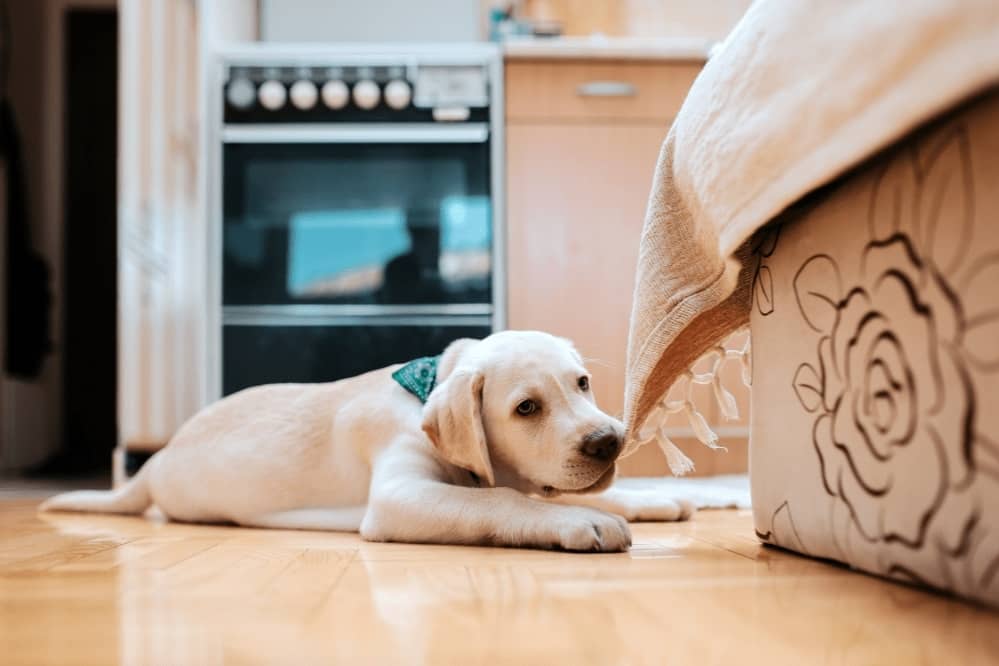It is normal for dogs to chew on themselves, to a certain extent. Yes, dogs will clean themselves, they sometimes itch themselves through chewing, and sometimes they have stuff stuck in their fur which can only be removed with their mouths.
For the most part, this is normal, but if you notice excessive chewing, especially on the same spot, then there might be a problem.
How to stop a dog from chewing on itself is not as simple as just giving it a toy to chew on. Your dog is not chewing on itself because it is bored or needs to exercise its teeth.
There is an underlying reason for obsessive chewing and gnawing. Before you can stop a dog from chewing on itself, you first need to know what the cause is. There are a few possible causes.
Dry Skin and Skin Problems
One of the reasons why dogs may chew on themselves a lot is if they have dry skin. Just like us humans, dogs can also suffer from dry skin. If your dog has dry skin, you may notice that it also has dandruff and that it scratches itself a lot too.
This is a difficult situation to deal with, because if you live in a dry environment, then dry skin usually follows. Some vets may recommend that you use a dog-friendly moisturizing shampoo or moisturizer to solve the situation.
Unfortunately, moisturizing a furry dog is not as easy as moisturizing your own skin. Another possible solution is to get a humidifier for your home to increase humidity levels.
There are also other skin problems which dogs may suffer from, with one being the overproduction of sebum, a substance that can cause flaky and dry skin, as well as itchiness. If you suspect that this may be to blame, it’s best to talk to your veterinarian.
An Injury
Another reason why dogs may chew on themselves is because they have an injury, particularly a cut, a scrape, or maybe something like a stick or thorn imbedded in a paw. Dogs will often chew and lick wounded areas in an attempt to get it to heal, which of course it does not.
Dogs may also do this when they have a bruised or broken bone. However, chewing and licking wounds or injuries of any kind is of course not going to help, and probably just make things worse.
If you notice excessive chewing and licking on the same spot, there is probably some sort of injury, in which case, if you cannot deal with it on your own, you may have to take the dog to a vet.
Allergies
Yes, dogs can in fact suffer from allergies, just like us humans do. Most dogs that suffer from allergies will be between 6 months and 3 years of age, although allergies can occur in dogs of all ages.
If you notice that your dog starts chewing on itself a lot, especially after doing a certain activity or going to a certain park, it may be allergies which are to blame. Allergies can also be foodborne. This is a difficult one to solve, because it’s not like the dog can tell you what it is allergic to.
Luckily, you can get an allergy test done for your dog, although it is not cheap. It is recommended to use hypoallergenic bedding and detergents, as well as using food that is designed for sensitive dogs.
Pests and Parasites
One of the leading causes of dogs chewing themselves and constantly itching themselves are parasites. Generally, these will be either ticks or fleas, but others like mosquitoes may also be to blame. If you live out in the country or in the forest, ticks are probably to blame.
If your dog interacts with lots of other dogs, it’s probably fleas that are to blame. Luckily, ticks and fleas alike are quite easy to spot if you inspect the dog’s skin and fur closely, and are not too hard to take care of either; there are various flea and tick treatments for dogs on the market.
Anxiety
Another reason why dogs may chew on themselves is if they are anxious. Anxiety can often lead to compulsive behavior, such as excessive chewing. If this is the case, try to do everything you can to alleviate anxiety in your dog.
Dogs can feel anxious, depressed, and lonely, all of which can lead to excessive and obsessive chewing. On a side note, it would not be the first time that a dog has been “diagnosed” with something like OCD (obsessive compulsive disorder).
Conclusion
Work your way through the above list to see if you can narrow down the cause of the chewing, and then, if possible, work on finding the right solution.

